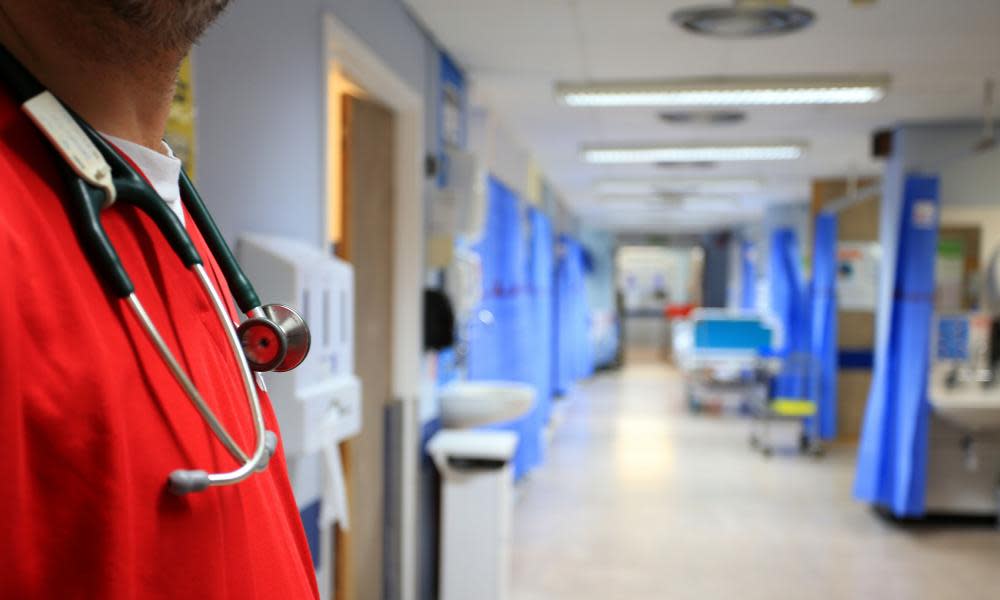Rise in assaults on staff reveals intolerable pressure on NHS

The revelation of the sharp increase in attacks on NHS staff highlights a problem which is serious, global and growing.
The survey by the Health Service Journal and Unison showed assaults in 2016-17 were almost 10% up on the previous year, driven by big increases in hospitals that were missing treatment targets or seriously in debt. Staff in mental health trusts were more than seven times more likely to be attacked than those in other trusts.
The World Health Organization says health workers are at a high risk of physical violence all over the globe, and estimates that between 8% and 38% of staff in different countries suffer at some point in their careers. A study by the International Council of Nurses concluded that healthcare workers were more likely to be attacked at work than prison guards or police officers, and that female nurses were most at risk.
On top of these attacks during day-to-day work, healthcare staff dealing with health emergencies such as wars are in enormous danger. WHO figures indicate that over the two-year period to 2015, 959 such healthcare workers were killed and 1,561 injured across 19 countries.)
A global study by the University of South Florida found that attacks on nurses tended to be concentrated in emergency departments and geriatric and psychiatric units. What unites these areas is that staff are working with patients who are in pain or distress, anxious and likely to feel that they have lost control of their lives. The author pointed out that geriatric and psychiatric patients are more likely to have poor impulse control.
This study uncovered striking differences across the world, with the highest rate of attacks occurring in the “anglo” countries, which included Australia, Canada, England, Ireland, New Zealand, Scotland and the US, at a rate almost double that in the Middle East. Underreporting may be a factor, but the difference appears stark.
Nurses working in Asia and the Middle East are more likely to be attacked by relatives and friends of the patient, showing how prevention strategies need to be tailored to local circumstances.
Of course, if there is violence all around you, it will come into the hospital. In the first six months after the Henry Ford hospital in Detroit installed metal detectors, staff confiscated 33 handguns, 1,324 knives and 97 chemical sprays.
The emotional and physical impact on staff who have been attacked includes headaches, loneliness, irritability, anger, insecurity, sadness, low self-esteem, sleeping disorders, stress and depression. Staff can become fearful of patients and it can cause difficulties with colleagues and family. The psychological impact is often magnified by the feeling that their profession is not respected. Many need time off work. Some simply quit.
Patients also suffer. It takes extraordinary professionalism to refuse to allow an awful experience with one intoxicated patient to cloud judgment about the next, while there are serious risks inherent in a loss of empathy for psychiatric patients.
The marked increase in violence in the trusts in England under financial and performance pressure hints at how a fraught, tense working environment can put staff and patients on edge. It is easy to understand how combining long waits for patients with stressed staff trying to run a system only kept on the rails through frantic activity creates an atmosphere where tensions and frustration escalate to assaults.
Potentially even more traumatic are attacks on staff working in the community, often alone. At least in a hospital someone will come to your aid. A Royal College of Nursing survey revealed that half of community nurses felt vulnerable, one in 10 had been assaulted and less than a quarter said their managers always knew when they were working alone.
The government must face up to the issue of staff being attacked. It needs to start collecting data on assaults again (having stopped last year) and recognise that – just as much as financial returns or performance figures – it reveals where the NHS is under intolerable pressure.
Join the Healthcare Professionals Network to read more pieces like this. And follow us on Twitter (@GdnHealthcare) to keep up with the latest healthcare news and views
If you’re looking for a healthcare job or need to recruit staff, visit Guardian Jobs

 Yahoo News
Yahoo News 
